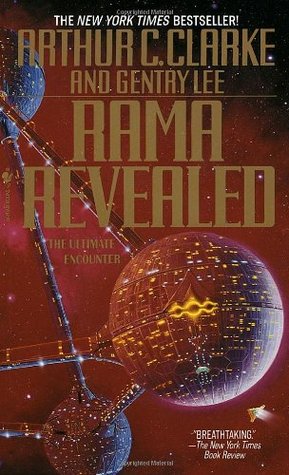
In spite of Clarke’s insistence that he never intended for there to be anything more to the story from Rendezvous with Rama, more there is. So much more. I’ve made it through the trilogy of sequels Clarke penned with Gentry Lee, so that’s our topic for this week’s supplemental edition of The Hugo Project.
—–

 Rama II
Rama II
The Garden of Rama
Rama Revealed
Arthur C. Clarke and Gentry Lee
published in 1989, 1991, and 1993
—–
Warning! Spoilers ahead!
—–
Hmm.
Okay, so, the first thing we need to understand is that Rendezvous was written as a stand-alone novel and the story stands perfectly well on its own.
The second thing we need to understand is that the sequel trilogy sequilogy was written (fifteen years later) primarily by Gentry Lee, with Clarke serving in an advisory/editorial capacity. So the tone of these books is very, very much different from that of Rendezvous. Where Rendezvous was all about the science and the unknown, the sequilogy is all about the characters.
And wow, are there a lot of them. It’s a bit tough to keep them all straight in Rama II; fortunately all but three go away for Garden, wherein new characters are introduced, but by the time I got to Revealed I think I mostly had all the names straight. The most significant character, of course, is Nicole des Jardins, a medical doctor of French and Senufo descent.
That’s right, folks, we’ve found our first WOC protagonist! Hooray! (It’s not a real victory until we find one in an actual Hugo-winner. Regardless, non-white characters, especially non-white, non-males, are about as common in most science fiction works as they are at the Republican National Convention.)
I’m not in the least bit qualified to discuss the fidelity of Nicole’s portrayal as a WOC, but I can say that she was an interesting, complex and likeable character, if still obviously written by a man. She is a skilled professional and very capable; she is also a mother. I find it a little irritating that she gets pigeonholed into the role of mother and nothing else for much of Garden, but I suppose there wasn’t much going on aboard Rama then anyway.
The children, and Nicole’s decisions regarding them, are…interesting. Frankly, if I were traveling to gods-only-know where in the galaxy aboard a semi-hostile spacecraft, I would not be bringing children into the world spacecraft if I could help it. I would certainly not go out of my way to produce more of them, or to make sure that I had both male and female children so that they would have mates when they were older, even if they were fathered by different men.
I would also not be nearly so happy with the circumstances of my daughters’ marriages as Nicole seemed to be. I have to take a moment here to ask:
Gentry, WTF is with the child brides?
I tend to have issues with relationships involving large age disparities. I’m not talking about a 30-yo with a 40-yo; I’m talking about a 50-yo with a 20-yo. Is this ageist of me? Perhaps. But there are some very good reasons why these relationships bother me.
Nine times out of ten, when you see a relationship with a large age disparity, it’s a heterosexual relationship between an older man and a younger woman. Starting to see where my problems come from? Older men marrying younger women ties in all too nicely with the infantilization of women, the idea that women are irrational and/or childlike, that they are less than capable adult beings. And it plays into the ageism faced by older women, reinforcing the idea that only young, conventionally attractive women are desirable and worthy of notice. Not to mention that these relationships, in fiction, are frequently written from the perspective of the male character, by men, especially older men… which makes the whole thing read as wish fulfillment, especially as we frequently are given little information on the woman’s perspective, or if we are, she doesn’t read as a well-developed character.
I’m not saying that relationships with large age gaps are necessarily bad, or that they can’t be done well. I can think of examples both from my own family history (I have a great-great-aunt who is my mother’s age) and from fiction (Welcome to Temptation by Jennifer Crusie, The Sharing Knife by Lois McMaster Bujold) where a much-younger woman has been involved with a much-older man and the relationship was believable and respectful of all parties. You’ll notice, however, that both of the fictional examples I cited were written by women (and damn good authors; go read their stuff NOW).
The sequilogy takes things a step further, though. Not only are there multiple marriages between a physically young woman and physically older man (13 and 70-something, ~18 and 40-something, etc), but several of those marriages involve children who spent most of their developmental years in suspended animation during interstellar travel. So while Ellie may have the body of an adult when she gets married, she has in fact been conscious for at most six years.
(Lee doesn’t do nearly enough investigation of what it might do to a child to go to sleep with the body and brain of a five-year-old and wake up with the body and brain of an 18-year-old, so far as I’m concerned. The children seem to slide into adult life and adult cognition (clearly Lee is unfamiliar with Piaget) with shocking ease. There’s suspension of disbelief, and then there’s I don’t actually want to deal with the consequences of this so I’ll make one of the girls into a drug whore and have the others be good little angels.)

Kids can totally jump to the top of the staircase an a day with no psychological consequences, right?
Anyway. Ellie is either 18 or 6, depending on how you count it, when she marries a (White) man probably in his 40s, who has committed racially-motivated murder against a Black man. Keep in mind that, as Nicole’s daughter, Ellie is also part-Black. Yet nobody has any qualms about this marriage, based either on Ellie’s age (SIX. YEARS.) or her husband-to-be’s demonstrated racial prejudices. WHAT. THE. FUCK.
We’re over a thousand words and I haven’t even talked about Benjy, Nicole’s mentally disabled son, or Katie (the aforementioned drug whore – I’d love to describe her differently, but that’s pretty much the only information Lee gives us about her – oh and the really offensive redemption-by-suicide ending), or the mysticism from Nicole’s Senufo heritage, or a thousand other things. There’s a lot going on in these books.
Lest you think I have nothing but complaints, I do want to finish on a high note and say that the alien species and cultures Lee has created are phenomenal. I loved getting to know the avians, the myrmicats/sessiles, and the octospiders. So that was awesome. And Nicole truly is a wonderful character; I really enjoyed following her journey. I know I’ve been critical of some of her choices, but I’m really criticizing Lee, since he’s ultimately the one who made those choices.
I don’t know whether or not to recommend the sequilogy. As I said, there’s a lot going on, good, bad, and indifferent. There is absolutely no need to read these three books after Rendezvous; I actually think they spoil it a little by providing a why behind Rama‘s appearance. On the other hand, Nicole and the aliens are awesome. So it’s up to you! Just brace yourself for the child brides.
—–
If you’re feeling hopelessly confused after all of that, don’t worry; so am I. Next week we get to move on to 1975, however, and a second Hugo-winner from Ursula K. Le Guin. If The Left Hand of Darkness was any indication, next week will be much more pleasant and much less problematic than this mess. The Hugo Project trundles on!

Dea
11.2.2014 at 4:08 pm
I’d not recommend reading much Anne McCaffrey then, if you have a problem with May-December romances. Add in the “falling in love with your mentor/tutor” aspect and we’ve got most of her work.
Myriad
11.2.2014 at 6:36 pm
OTOH, she (probably? hopefully?) gives us a decent female perspective in a May-female, Dec-male romance.
And maybe it’s because I’m a teacher, but I’ve always had a huge problem with teacher/student relationships. There is not enough nope in the world. Just too much of a power difference/opportunity for exploitation. I don’t necessarily have a problem with student/tutor relationships, because the power differential is much less in that case.
…full disclosure: I have a habit for falling for guys who are better than I am at the things I want to be good at. But, like, my fellow students who are better than me, not the teacher/professor.